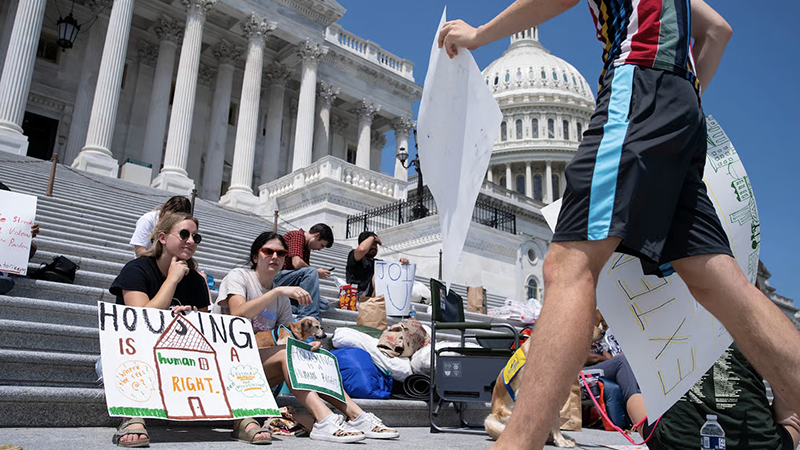
Washington, D.C. has been at the center of a whirlwind of activity this week, with major developments impacting everything from federal paychecks to historic landmarks and local laws. As the federal government shutdown extends into its fourth week, the economic strain on the region is becoming more apparent. Meanwhile, a controversial demolition project at the White House is drawing crowds and criticism, and the D.C. Council has been busy with a series of contentious legislative decisions.
This week’s roundup will guide you through the key events shaping the District. We will cover the ongoing effects of the shutdown, the details surrounding the East Wing demolition, and the significant laws passed by the city’s council. We’ll also touch on other important local news, including a new grocery pilot program and recent crime updates.
Government Shutdown Enters Fourth Week
The partial federal government shutdown, which started on October 1, shows no signs of ending. Now in its fourth week, negotiations between Senate Republicans and Democrats have stalled, leaving hundreds of thousands of federal workers in limbo. This week marked a difficult milestone as many furloughed employees missed their first full paycheck, sending ripples of economic anxiety throughout the D.C. metro area.
The financial impact is being felt deeply across the region, where a significant portion of the workforce is tied to the federal government. In response to the growing hardship, local organizations are stepping up. The Capital Area Food Bank, for example, has expanded its food distribution services to support affected federal workers and their families, highlighting the community’s effort to mitigate the shutdown’s consequences. As the stalemate continues, concerns are growing about the long-term economic damage to the region’s businesses and residents.
White House East Wing Demolition Sparks Controversy
This week, demolition crews began dismantling the White House East Wing to make way for a new ballroom, a project ordered by President Trump. The sight has become a tourist attraction, drawing onlookers and significant backlash from D.C. residents and officials alike. Critics argue the project is divisive and ill-timed, especially given the ongoing government shutdown. The demolition has also blocked the entrance for White House tours, adding to the public’s frustration.
The White House has stated that the $300 million project will be privately funded and will not use taxpayer money. However, the controversy extends beyond the cost. The District has filed a lawsuit related to the National Guard’s deployment at the site, which a federal judge is scheduled to review this Friday. The project underscores the tension between federal plans and local sentiment, turning a construction site into a focal point of political debate.
D.C. Council Pushes Through Key Legislation
It was a busy and consequential week for the D.C. Council, which passed several significant and controversial pieces of legislation. These decisions touched on everything from educator pay and tenant rights to youth curfews and marriage equality, reflecting a complex and often divided legislative body.
Here are some of the key updates:
- Rental Act Amendments: The council moved to tighten language in the RENTAL Act, a move that dials back pay rates for early childhood educators. The decision was made with the intention of revisiting the complex issue of educator compensation at a later date.
- Tenant Rights Rollback: In a separate and contentious vote, the council scaled back certain tenant protections, specifically for those living in small rental properties. This decision has raised concerns among housing advocates about its impact on vulnerable renters in the city.
- Youth Curfew Debate: A proposal for a youth curfew was initially rejected by the council. However, in a surprising turn, the measure was revived later in the week, albeit in a delayed form, reigniting debates about public safety and youth rights.
- “Love Act” Reinstated: With the federal shutdown threatening to disrupt city services, the council acted quickly to reestablish the “Love Act.” This legislation ensures the District can continue to issue marriage licenses independently, safeguarding a key function from federal gridlock.
Other Notable Headlines Around the District
Beyond the major stories, several other developments captured the city’s attention this week. D.C. launched a two-year pilot program to address food insecurity by delivering groceries to low-income residents in areas with limited access to full-service stores. The program, which partners with Instacart, will cover membership and delivery fees.
In crime news, D.C. police made an arrest in connection with a 2023 shooting that left three people dead. Meanwhile, the FBI released new videos of the suspect who planted pipe bombs at the DNC and RNC headquarters in 2021, a case that remains unsolved. On a different note, residents should prepare for road closures this weekend ahead of the 50th Marine Corps Marathon on Sunday, October 26.
Staying Informed in a Busy City
This week has shown once again how quickly things can change in Washington, D.C. From the far-reaching effects of the federal shutdown to the heated debates within the D.C. Council, the decisions made here have a direct impact on the lives of everyone in the region. The demolition at the White House and new local initiatives further highlight the dynamic and often complex nature of the city.
Staying informed about these developments is more important than ever. We encourage you to follow local news outlets and participate in community discussions to keep up with the issues that matter most. As the city continues to evolve, being an engaged resident is the best way to understand and help shape its future.
#DCNews #Shutdown2025 #WhiteHouseDemolition
